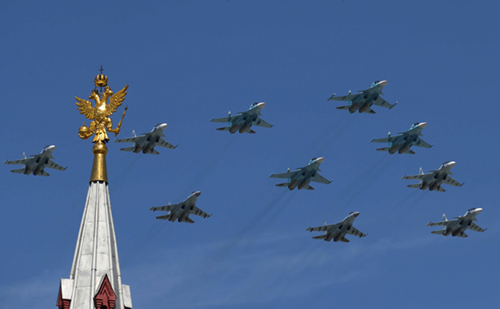Contestable Claims
Far too often we see a significant gap between Russia-related claims, even by top officials and respected authors, and the reality on the ground. We also often encounter a wide divergence in expert views on crucial policy questions related to Russia. This section has two basic aims: (1) to dispel misconceptions that could adversely affect the quality of U.S. policy toward Russia, particularly when vital U.S. interests are involved, through rigorous fact-checking where possible and (2) to identify and debate key dilemmas for decision-makers per the adage that “truth is born in argument.”
We invite you to explore the section and send us more claims to fact-check or debate using the rectangular red button below. (For most fact-checks, we’ve adopted the "traffic light" rating system: red for incorrect; yellow for partially correct; green for correct.)
We invite you to explore the section and send us more claims to fact-check or debate using the rectangular red button below. (For most fact-checks, we’ve adopted the "traffic light" rating system: red for incorrect; yellow for partially correct; green for correct.)
Claim in 2018: “Russia relies heavily on energy exports for close to three-quarters of its export earnings and over half of its budget.”
Partially Correct: Energy has accounted for less than 70 percent of Russia’s export earnings since 2014, hovering between 62 and 64 percent in 2015-2018; oil and gas—Russia’s most lucrative energy exports—provided under 50 percent of its federal budget revenue in 2015-2017 and for most of this year, although they did account for just over 50 percent in January-February 2018. (Fact-check done in July 2018.)
Read More
Share
Claim in 2017: "Russia has doubled its fighting power on its Western border.”
Partially Correct: While Russia has fielded additional units in the military districts flanking its western border since 2014, the forces have not doubled; they’ve grown by a smaller degree, ranging from 13 to 50 percent depending on the military unit counted. (Fact-check done in February 2018.)
Read More
Share
Claim in 2017: Russians’ “life expectancy at birth ranks 153rd in the world, just behind Honduras and Kazakhstan.”
Correct: That is the most recent ranking, given by the CIA. Slightly older World Bank and U.N. rankings came close. (Fact-check done in April 2017.)
Read More
Share
Claim in 2017: “In terms of per capita income, Russia ranks 73rd (in terms of purchasing power parity)…”
Partially Correct: While the CIA ranks Russia 73rd, the country's lowest ranking from either the World Bank or IMF in their most recent data is 52nd. (Fact-check done in April 2017.)
Read More
Share
Claim in 2017: "Because we [the U.S.] have stood firm, Russia is now—despite the boasts of its leaders—plagued by dwindling financial reserves, a historically weak ruble and poor international relations."
Partially Correct: At the time of this statement the Russian ruble was stronger versus the U.S. dollar than at any time since Fall 2015. (Fact-check done in January 2017.)
Read More
Share
Claim in 2016: Russia’s “economy doesn’t produce anything that anybody wants to buy, except oil and gas and arms.”
Partially Correct: Russia also successfully sells goods and services in the space and nuclear-power industries. (Fact-check done in December 2016.)
Read More
Share
Claim in 2016: Russia’s GDP contracted by 40% between 2013 and 2015. Its economy is now half the size of Great Britain’s.
Partially Correct: Correct only when measured in current USD without adjusting for inflation or other variations. (Fact-check done in November 2016.)
Read More
Share
Claim in 2014: Immigrants aren’t rushing to Moscow in search of opportunity.
Incorrect: Russia’s international migrant population is the world’s third largest. (Fact-check done in October 2016.)
Read More
Share

 In May 2018 numerous respected media outlets, including
In May 2018 numerous respected media outlets, including 